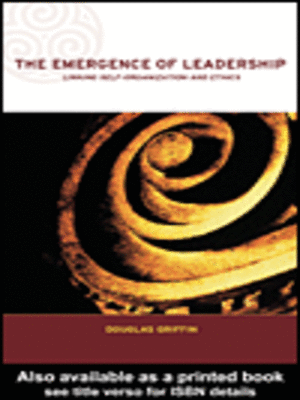The Emergence of Leadership
ebook ∣ Linking Self-Organization and Ethics · Complexity and Emergence in Organizations
By Douglas Griffin

Sign up to save your library
With an OverDrive account, you can save your favorite libraries for at-a-glance information about availability. Find out more about OverDrive accounts.
Find this title in Libby, the library reading app by OverDrive.



Search for a digital library with this title
Title found at these libraries:
| Library Name | Distance |
|---|---|
| Loading... |
The second half of the twentieth century witnessed the emergence of the most complex global organizations humans have ever known. This book focuses on the key factor which is identified as sustaining them, namely that of leadership. Leadership in organizations is currently understood primarily from a perspective based on systems thinking which underlies theories of organizational culture, practice and learning. Leadership is seen to be an attribute of the individual and the leadership role is that of articulating values, missions and visions and then persuading others to adhere to them.
Increased complexity in organization has occurred in human history many times before: for example, the Greek "polis" of Athens, the military defence of increasingly large areas of land based on aristocracy and monarchy, national states with democratic elections and representative bodies. Accompanying these changes there have always been intense debates resulting in new understandings of leadership and ethics. We are at such a point now.
This volume argues for an ethics of participative self-organization. The author holds that this means the end of "business ethics" as we know it today. In the past we have focused on the choices of individual leaders. In today's highly complex organizations we are now coming to understand the nature of the emergence of leadership. This means that we can no longer understand ethics simply as such choice in planning and action. This will necessarily include understanding more about the nature of risk and conflict, spontaneity and motivation.
Increased complexity in organization has occurred in human history many times before: for example, the Greek "polis" of Athens, the military defence of increasingly large areas of land based on aristocracy and monarchy, national states with democratic elections and representative bodies. Accompanying these changes there have always been intense debates resulting in new understandings of leadership and ethics. We are at such a point now.
This volume argues for an ethics of participative self-organization. The author holds that this means the end of "business ethics" as we know it today. In the past we have focused on the choices of individual leaders. In today's highly complex organizations we are now coming to understand the nature of the emergence of leadership. This means that we can no longer understand ethics simply as such choice in planning and action. This will necessarily include understanding more about the nature of risk and conflict, spontaneity and motivation.







